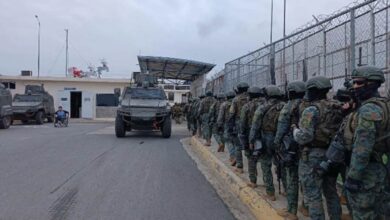Who is Monsignor Óscar Romero, “the saint of America”?
Today the first saint born in El Salvador was canonized, here we tell you who was fervent defender of human rights was

Leer en español: ¿Quién es monseñor Óscar Romero, "el santo de América"?
Today, Sunday, October 14, Pope Francis canonized the first Salvadoran saint in St. Peter's Square in the Vatican in front of more than 70,000 people, including the authorities of El Salvador. He is Monsignor Óscar Arnulfo Romero, born in Ciudad Barrios in 1917 and died in San Salvador in 1980.
During the ceremony, another six religious were canonized. Pope Francis proclaimed them saints with a Latin formula and wore himself an accessory that had previously belonged to Monsignor Óscar Romero. The Salvadoran President Salvador Sánchez Cerén attended the ceremony with his delegation.
Who is 'the Saint of America'?
The Salvadorans have given this name to Monsignor Óscar Arnulfo Romero for his concern and sensitivity towards the lower social classes throughout Latin America. He was often labeled a Marxist and associated with the theology of liberation, a Christian movement born in Latin America that proclaims the preference that the church should have for the poor.
This movement would later be famous and would be the current especially priest Camilo Torres, a Colombian who was a member of the guerrilla. Although according to his biographer, Romero never claimed to belong to this current or showed greater interest, one of the crucial moments for the creation of the theology of liberation was in the Episcopal Assembly in Medellin, after which the priest showed more zealously his concern for the disadvantaged classes.
Also read: Abused nuns, a disturbing reality in Chile
He was also often associated with the Salvadoran guerrillas because of the denunciations he made in his homilies as archbishop about human rights violations in his country. Over time his social commitment and political ideas, which were opposed by the military regime, were more notorious while he was promoted within the Catholic Church.
This provoked the disapproval of the Salvadoran extreme right. Monsignor Romero died, then, assassinated while giving mass in the chapel of the Divina Providencia hospital, it is suspected that due to his denunciations and his defense of human rights. The Catholic Church granted him the title of martyr after his tragic death.
Pope Francis has said that both he and Pope Paul IV, who was also canonized and proclaimed saint today, were great influences in his formation. The popularly called saint of America was also regarded with disapproval by the more conservative wings of Catholicism, an experience with which Pope Francis can identify. This year, moreover, half a century of the aforementioned assembly of Medellin is celebrated, which began the theology of liberation.
Also read: Shameful and painful: Latin American pedophilia cases that embarrass the Catholic Church
The Latin American saints who revolutionized the church
Mother Nazaria Ignacia was also proclaimed saint today. She was born in Madrid in 1889, but spent almost the entirety of her religious life in Bolivia, so many parishioners from this country traveled to the Vatican to see the canonization ceremony of this nun who is called as the first Bolivian saint.
This saint is known because in 1920 she founded a congregation that now has a presence in more than 21 countries, according to the infobae portal. However, this nun did much more for her faith and especially for the women around her.
In addition to addressing issues of faith, in her congregation the Nazaria mother attended to political and social issues. In 1933, she organized the women of Oruro's commerce to create the first women's union in Bolivia. She was imprisoned along with other nuns during the Spanish Civil War because of her religious status in 1936, but was released very quickly as she was respected in several countries of Latin America, whose governments interceded for her release.
As can be seen, these Latin American religious who are saints as of today are not only because of their work within the church but also outside it.
LatinAmerican Post | Juliana Rodríguez
Translated from “¿Quién es monseñor Óscar Romero, "el santo de América"?”
Listen this article





